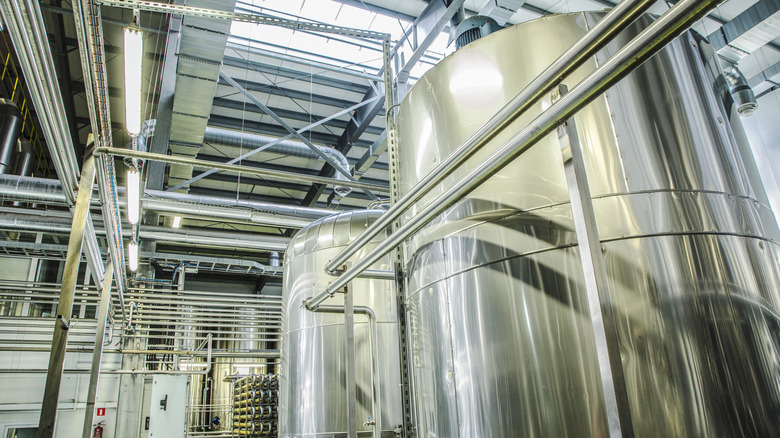What Is Juice Concentrate Anyway (And How Is It Made)?
When you're cruising through the juice aisle, you're bound to notice these words on a few of the bottles: 'not from concentrate.' They make it a big selling point, and advertisements for juice brands often emphasize this claim, framing it as a benefit. But what is juice concentrate in the first place, and is regular juice really that much better?
In the simplest terms, juice concentrate is any fruit or vegetable juice that has had its water content removed. Water can make up as much as 90% of a juice's total volume, and when you take it out of the equation, you are left with a viscous syrup. Eliminating the water makes the juice inhospitable to bacteria, extending its shelf life. Drinking expired juice can upset your stomach, so there's an advantage to the consumer in that regard. Juice concentrate needs to be diluted with water before drinking it, which can be done by the consumer or the producer. Now why would someone remove the water from juice only to add it back? Because it benefits the juice company.
By prolonging juice's shelf life, producers have more time to store and transport it from the point of origin to the final facility where it's diluted and distributed. The lower volume also reduces the cost of storage and shipping, and each delivery can pack in more total volume than regular juice once water is added back to the concentrate. How is all of this done? There are multiple answers to that question.
How juice concentrate is made
There are three main methods of making juice concentrate: vacuum concentration, freeze concentration, and membrane concentration. They're a bit complex, so let's break each one down. The vacuum concentration method is the most straightforward. It entails steam-heating the fruit or vegetable juice to its boiling point, at which time the water will evaporate. In order to expedite this process, vacuum concentration is done in a device that creates a low-pressure environment, reducing the boiling point of the water. This process is repeated up to five times to create the strongest concentration.
Freeze concentration is essentially the opposite of the vacuum concentration method. The juice is a solution in which the water acts as the solvent and the rest of the fruit or vegetable elements comprise the solute. These two components can be separated if the temperature of the juice is lowered to the freezing point of water. This creates ice crystals that can be isolated from the solute, leaving you with juice concentrate. Freeze concentration is great for products that are very heat sensitive, but it inevitably leads to some of the plant solute being lost with the water.
Membrane concentration uses reverse osmosis, a common filtration method. Reverse osmosis is done by forcing a solution through a semipermeable membrane that separates the water content from the solute. It is often used to remove contaminants from drinking water, but in the case of juice, it separates water from the fruit or vegetable solute.
Juice concentrate vs. regular juice
How does fruit concentrate stack up to juice not from concentrate, and is the latter really as good as some juice producers make it sound? Concentrated juice does retain many of the nutrients found in its fruit or vegetable source. For example, citrus juices retain most of their vitamin C content and carrot juice still offers provitamin A. Juices can also provide antioxidants. Looking beyond nutrition, however, juice concentrates offer the obvious benefit of staying fresh in your fridge for longer, which is especially advantageous if it's difficult to access fresh produce where you live. And it's more affordable to boot.
All that being said, juice concentrates have more downsides than upsides when it comes to your health. For starters, the juicing and concentration processes remove fiber, which is important for digestive health. Fiber regulates your blood sugar levels, slowing the rate of absorption and keeping you feeling full for longer. Derived of their fiber, fruit juice can cause a rapid spike in blood sugar. This is an issue with regular juice as well, so it's important to keep whole fruits and vegetables in your diet.
The biggest concern with juice concentrates is the fact that they often contain additives such as potassium sorbate and sodium benzoate. Both are considered safe to consume by the FDA, but they can cause allergic reactions in some people. Of greater concern is the fact that high fructose corn syrup is often added to these juices as well.


